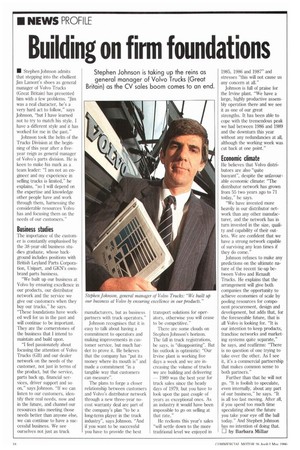Building on firm foundations
Page 20

If you've noticed an error in this article please click here to report it so we can fix it.
Stephen Johnson is taking up the reins as general manager of Volvo Trucks (Great Britain) as the CV sales boom comes to an end.
• Stephen Johnson admits that stepping into the ebullient Jim Lamont's shoes as general manager of Volvo Trucks (Great Britain) has presented him with a few problems. "Jim was a real character, he's a very hard act to follow," says Johnson, "but I have learned not to try to match his style. I have a different style and it has worked for me in the past."
Johnson took the helm of the Trucks Division at the beginning of this year after a fiveyear reign as general manager of Volvo's parts division. He is keen to make his mark as a team leader: "I am not an engineer and my experience in selling trucks is limited," he explains, "so 1 will depend on the expertise and knowledge other people have and work through them, harnessing the considerable resources Volvo has and focusing them on the needs of our customers."
Business studies
The importance of the customer is constantly emphasised by the 38-year-old business studies graduate, whose background includes positions with British Leyland Parts Corporation, Unipart, and GKN's ownbrand parts business.
"We built up our business at Volvo by ensuring excellence in our products, our distributor network and the service we give our customers when they buy our trucks," he says. -These foundations have worked well for us in the past and will continue to be important. They are the cornerstones of the business that I intend to maintain and build upon.
"I feel passionately about focusing the attention of Volvo Trucks (GB) and our dealer network on the needs of the customer, not just in terms of the product, but the service, parts back up, financial services, driver support and so on," says Johnson. "If we can listen to our customers, identify their real needs, now and in the future, and channel our resources into meeting those needs better than anyone else, we can continue to have a successful business. We see ourselves not just as truck manufacturers, but as business partners with truck operators."
Johnson recognises that it is easy to talk about having a commitment to operators and making improvements in customer service, but much harder to prove it. He believes that the company has "put its money where its mouth is" and made a commitment "in a tangible way that customers can measure".
The plans to forge a closer relationship between customers and Volvo's distributor network through a new three-year nocost warranty deal are part of the company's plan "to be a long-term player in the truck industry", says Johnson. "And if you want to be successful you have to provide the best transport solutions for operators, otherwise you will cease to be competitive."
There are some clouds on Stephen Johnson's horizon. The fall in truck registrations, he says, is "disappointing". But his outlook is optimistic: "Our Irvine plant is working five days a week and we are increasing the volume of trucks we are building and delivering — 1989 was the best year for truck sales since the heady days of 1979, but you have to look upon the past couple of years as exceptional ones. As an industry it would have been impossible to go on selling at that rate."
He reckons this year's sales "will settle down to the more traditional level we enjoyed in 1985, 1986 and 1987" and stresses "this will not cause us any concern at all."
Johnson is full of praise for the Irvine plant. "We have a large, highly productive assembly operation there and we see it as one of our great strengths. It has been able to cope with the tremendous peak we had between 1986 and 1989 and the downturn this year without any redundancies at all, although the working week was cut back at one point."
Economic climate lie believes that Volvo distributors are also "quite buoyant", despite the unfavourable economic climate: "The distributor network has grown from 55 two years ago to 71 today," he says.
"We have invested more heavily in our distributor network than any other manufacturer, and the network has in turn invested in the size, quality and capability of their outlets. We are confident that we have a strong network capable of surviving any lean times if they do come."
Johnson refuses to make any predictions on the ultimate nature of the recent tie-up between Volvo and Renault Trucks. He explains that the arrangement will give both companies the opportunity to achieve economies of scale by pooling resources for component procurement, design and development, but adds that, for the foreseeable future, that is all Volvo is looking for. "It is our intention to keep products, franchise networks and marketing systems quite separate," he says, and reaffirms: "There is no question of one trying to take over the other. As I see it, it's a commercial partnership that makes common sense to both partners."
Further than that he will not go. "It is foolish to speculate, even internally, about any part of our business," he says. "It is all too fast moving. After all, if you spend too much time speculating about the future you take your eye off the ball today." And Stephen Johnson has no intention of doing that. 0 by Barbara Millar
























































































































